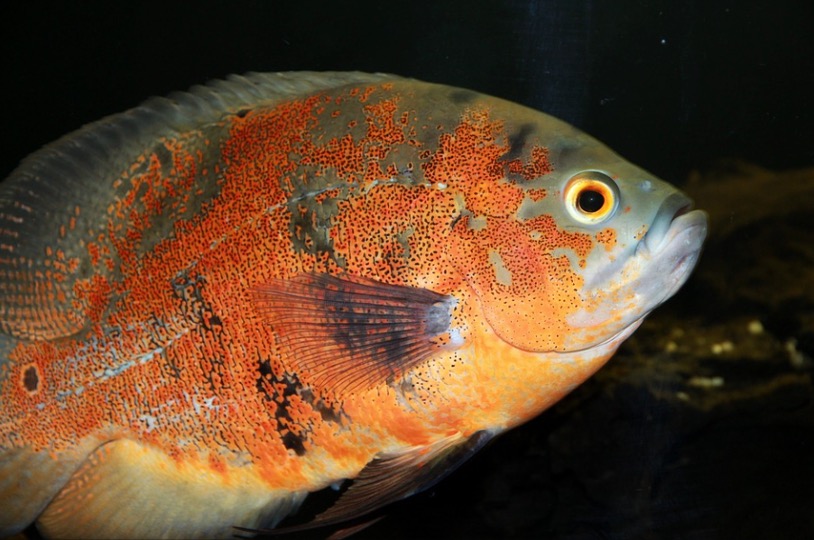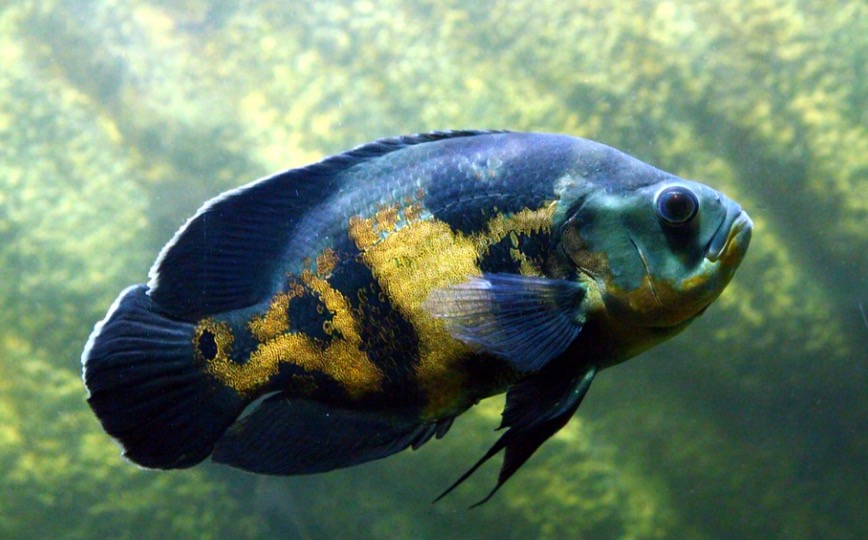Table of Contents
Oscar Fish: All You Need
An Oscar fish is a river predator that belongs to the kingdom of Animalia, phylum Chordata, and class Actinopterygii. Its genus is Astronotus, and its species is Astronotus ocellatus. Its length is up to 45 cm, and it weighs up to 1,600 g. It lives in warmer rivers, with a lifespan of up to 10 years.

What is Oscar Fish?
The oscar fish (or simply oscar) is a cichlid species often kept in freshwater aquariums. The Oscar is native to portions of South America, including the Amazon River Basin, although it has now spread to other parts of the world. Oscar fish come in a wide variety of colours and patterns as an aquarium species.

The “tiger oscar,” which is remarkably close to the wild oscar fish, is the most frequent type. Albino variants, leucistic (mainly white) types, and xanthistic (yellowish) varieties are also available. These variations are still part of the Astronotus ocellatus species, despite being sold under a number of distinct trade names.

Oscars are predatory fish that eat a variety of smaller creatures such as catfish, crabs, and aquatic insect larvae in the wild. Oscars use suction to acquire prey by quickly extending their lips and sucking in smaller creatures. These fish thrive in captivity on a variety of diets designed for large carnivorous fish. However, they do have a particular demand for vitamin C, which they can sometimes meet by eating fallen fruits in the wild.

Despite the fact that the oscar is native to regions of South America, its popularity as an aquarium fish has resulted in numerous introduction events in rivers all over the world. Some wild Oscars have been discovered as far as China! Native species in an environment that have not adapted to the huge predator may face difficulties as a result of these invasions.
Fun Facts About Oscar Fish
While the oscar is a popular aquarium fish, many owners are unaware of the fascinating biological principles displayed by their fish. In fact, the Oscar is a fantastic illustration of the underlying principles!
Oscar Fish: a Suction Feeding
Inhale as much air as possible. Did you eat an apple that was sitting 3 feet away? Most likely not… The oscar fish, on the other hand, eats in the same way! Oscar fish, like many other predatory fish, take advantage of the viscosity of water.
Water is considerably denser than air, which flows easily around things. Furthermore, the mechanism of cohesion causes water molecules to tug on one other. As a result, a huge wall of water is pulled in when the Oscar opens its mouth fast. Smaller fish trapped in the wave are sucked into the oscar’s mouth, where they have little chance of escaping.
Suction feeding is used by a variety of aquatic species, including fish. Suction feeders include sharks, newts, catfish, and a variety of other creatures. Suction feeders are sometimes “ambush predators,” waiting for their prey to get near enough to be trapped in the suction vortex.
Oscar Fish is a Invasive Aquarium Fish
The oscar fish isn’t the only fish whose range has increased since it became popular as an aquarium species. Unfortunately, the aquarium business has released a slew of invasive species into natural habitats all over the world. While the environmental impact of oscar fish releases is unknown, other aquarium species that have been released have wreaked havoc on natural habitats.
The Zebrafish, for example, is a popular saltwater aquarium species. In captivity, the fish is stunning, colourful, and fascinating to watch. As a result, the fish was brought to the United States from its native Indian Ocean habitat. However, a few Zebrafish were discharged into the Gulf of Mexico by mistake.
After only a few decades, the Zebrafish has evolved into a highly destructive species throughout many Gulf reefs. The Zebrafish can devour practically everything and has no natural predators in the Gulf of Mexico since it is a voracious predator with a multitude of defensive spines.
As a result, zebrafish populations have skyrocketed, threatening the survival of numerous fish species critical to coral reef health. Indeed, this invasive species is so damaging that it has been blamed in part for the destruction of corals from South America to Florida.
Oscar Fish: Brood Care
Even though the Oscar is a ravenous predator, it can also be a kind parent. The Oscar fish protect their area by driving away any other fish that approach too closely and devouring anything small enough to fit in their huge mouths. The Oscars, on the other hand, are extremely cautious when it comes to their children.
In fact, the oscar fish will safeguard its young and will avoid sucking them up. This is referred to as “brood care,” and it is a kind of parental care that may be found in a variety of fish species. Unlike other fish, the oscar will defend its babies until they are big enough to depart and establish their own territory.
Oscar Fish Citations
- Cryptosporidium bollandi n. sp. (Apicomplexa: Cryptosporidiiae) from angelfish (Pterophyllum scalare) and Oscar fish (Astronotus ocellatus). Exp Parasitol . 2020 Oct;217:107956.
- Neoplasms of the urinary tract in fish. Vet Pathol . 2014 Sep;51(5):1000-12.
- Evaluation of the anesthetic efficacy of alfaxalone in oscar fish (Astronotus ocellatus). Am J Vet Res . 2016 Mar;77(3):239-44.







